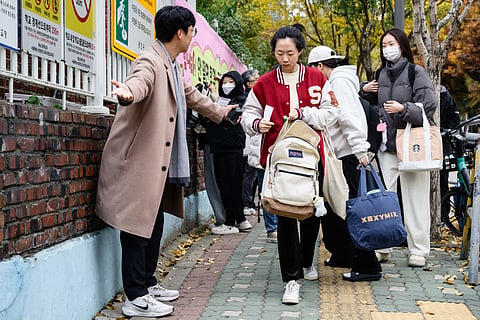When a nation holds its breath: South Korea’s exam day rituals take over life
From flight bans to prayer, the Suneung turns country into support system for teenagers

Seoul: Every November, South Korea transforms. Flights are grounded, stock markets open late, workplaces delay their day — all so hundreds of thousands of teenagers can sit the Suneung, the college entrance exam that dictates futures with near-mythic force.
This year was no different. As anxious students filed into test centres with tightly clutched pencils and prayer notes, the country slipped into its annual ritual of silence and superstition. For 35 minutes during the English listening test, the entire nation banned aircraft from taking off or landing. Public offices told staff to report an hour later to keep roads clear. Banks shifted their opening times. It was as if the country itself were holding its breath.
The Suneung — short for the College Scholastic Ability Test — is more than an academic milestone. It is a cultural event layered with belief, tradition and fear, seen by many as a gateway to social mobility, respectable careers and even good marriages. Families describe it as the most defining day of a teenager’s life.
“I am really nervous but as I have prepared so much, I will do my best,” said 18-year-old Kim Min-jae, walking into his exam hall in Seoul, AFP reported. “My parents are even more nervous than I am,” he added with a nervous smile.
Outside Yongsan High School, younger students lined the gates in a yearly display of collective solidarity. They held up neon posters — Get 100 score on Suneung! — and chanted encouragement, hoping to pass along good luck that they themselves will need in the years ahead. Police stood by, ready for the annual rush of sirens as officers transport late students at high speed to their centres.
Some of the world’s toughest exams
Gaokao (China)
Ultra-competitive national exam determining university entry; millions take it annually.
UPSC Civil Services Exam (India)
Multi-stage process spanning nearly a year; selects candidates for elite government posts.
Suneung / CSAT (South Korea)
High-stakes university entrance test that can influence career, status and marriage prospects.
Master Sommelier Diploma Exam (International)
Infamously difficult wine exam with a tiny pass rate in tasting and theory.
All Souls Prize Fellowship Exam (Oxford University, UK)
Known as the “hardest exam in the world”; includes essay questions with no preparation material.
Bar Exam (Japan)
Historically very low pass rates; considered one of the toughest legal qualifications.
USMLE Step 1 (United States)
Core medical licensure exam requiring exhaustive biomedical knowledge
A day shaped by belief
Test day traditions are deeply ingrained. Chief among them: students avoid seaweed soup, a popular Korean comfort dish with slippery strands thought to symbolise “slipping” in the exam. Many parents prepare special breakfasts, tuck talismans into pockets or gather with friends at churches and Buddhist temples, reciting prayers timed to match the exam schedule.
Han Yu-na, a 50-year-old mother whose son is sitting the Suneung, followed her usual routine — prayers mirroring the timetable, lunch when he breaks, silence when he listens. “My son Young-woo, I hope you pour your best until the end. I love you,” she said.
The Suneung shapes not only families but the rhythm of national life. Traffic patterns shift. Workplaces slow down. Television studios mute their sets during listening rounds. The stakes are so high, and the consequences so personal, that the country quietly agrees every year to rearrange itself around the hopes of 17- and 18-year-olds.
A changing system
More than 550,000 students registered for Thursday’s exam. The competition remains fierce, but the system is evolving. Beginning with the 2026 cycle, all four-year universities will be required to consider school bullying records in admissions — a shift driven by victims speaking out in a wave of public testimony demanding accountability.
Previously, institutions could choose whether to examine a student’s disciplinary history. Now, it will be mandatory. Ten state-run universities rejected 45 applicants with school violence records in the last cycle alone, data from lawmaker Kang Kyung-sook shows.
As Korea debates heavier reliance on holistic assessments and reforms to ease pressure, one fact remains unchanged: on Suneung day, the country operates not on timetables but on shared belief — that for one day, the dreams of its young should be protected from every possible distraction.
- with inputs from AFP
Sign up for the Daily Briefing
Get the latest news and updates straight to your inbox




